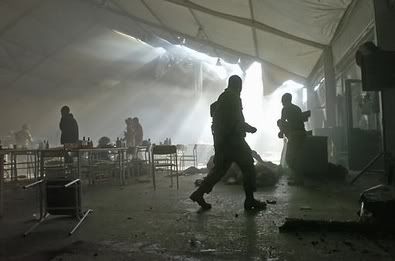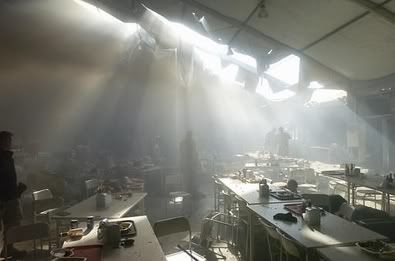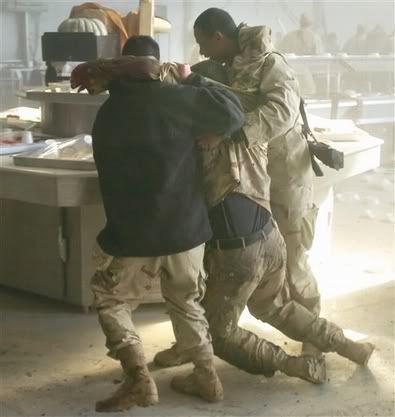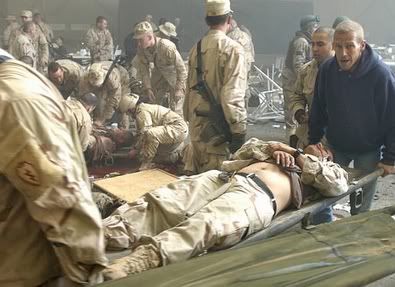Mosul rocket attack kills 15 U.S. troops, 5 other Americans and 2 Iraqis
FORWARD OPERATING BASE MAREZ, Iraq - A sudden, pinpoint attack killed at least 22 people and wounded more than 60 others in a dining-hall tent inside a U.S. military compound near Mosul yesterday.
It was the deadliest single attack on U.S. troops since the start of the Iraq war.
Early today, Capt. Brian Lucas, a military spokesman in Baghdad, said the dead included 20 Americans - 15 service members and five civilians from the Halliburton subsidiary KBR and its subcontractors. Two Iraqi soldiers were also killed. Sixty-six people were wounded, including 42 U.S. troops, The Associated Press reported.

The military said the tent was hit by a 122 mm rocket. A radical Muslim group, the Ansar al-Sunnah Army, claimed responsibility.
Two of the slain soldiers were from the Richmond-based 276th Engineer Battalion of the Virginia National Guard. They are the first fatalities for the unit since it arrived in Iraq nearly a year ago.
Hundreds of U.S. soldiers had just sat down for lunch about noon when the blast hit the giant dining tent.
The force of the explosion knocked soldiers off their feet and out of their seats. A fireball enveloped the top of the tent, and pellet-sized shrapnel sprayed into the men.
Amid the screaming and thick smoke that followed, quick-thinking soldiers turned their lunch tables upside down, placed the wounded on them and gently carried them into the parking lot.
"Medic! Medic!" soldiers shouted.
Medics rushed into the tent and hustled the rest of the wounded out on stretchers. Scores of troops crammed into concrete bomb shelters outside. Others wobbled around the tent and collapsed, dazed by the blast.
"I can't hear! I can't hear!" one female soldier cried as a friend hugged her.
Near the front entrance to the chow hall, troops tended a soldier with a gaping head wound. Within minutes, they zipped him into a black body bag. Three more bodies were in the parking lot then. Soldiers scrambled back into the hall to check for more wounded. The explosion blew out a huge hole in the roof of the tent. Lunch trays and overturned tables and chairs covered the floor.

Soldiers growled angrily about the attack and swore as they stomped away. Sgt. Evan Byler, of the 276th, steadied himself on one of the concrete bomb shelters. He was eating chicken tenders and macaroni when the blast hit. The blast knocked him out of his chair. Byler had taken off his shirt and wrapped it around a seriously wounded soldier.
Byler held the bloody shirt in his hand, not quite sure what to do with it. "It's not the first close call I have had here," said Byler, a Fauquier County, Va., resident who survived a blast from an improvised explosive device while riding in a vehicle earlier this year.
Byler started walking back to his base when he saw a soldier collapse from shock on the side of the road. Byler and 1st Lt. Shawn Otto of Williamsburg, Va., also of the 276th, put the grieving soldier on a passing pickup truck.
The 276th, with about 500 troops, had made it a year without losing a soldier and is preparing to return home in about a month. "We almost made it. We almost made it to the end without getting somebody killed," Otto said glumly.
At least four other soldiers with the 276th were injured, but it was not clear how serious their wounds are.
"This is the worst day of my life," Brig. Gen. Carter F. Ham said at a briefing held at a palace once used by Iraqi dictator Saddam Hussein's sons. "It's times like these when [our troops] really come shining through."

Tears welled in his eyes, and his voice was thick with emotion. "This hurts, this really hurts." The military asked that the dead not be identified until families could be notified.
Insurgents have fired mortars at the chow hall more than 30 times this year. One round killed a female soldier with the 3rd Brigade, 2nd Infantry Division, in the summer as she scrambled for cover in a bomb shelter. Workers are building a new steel-and-concrete chow hall for the soldiers just down the dusty dirt road.
Lt. Dawn Wheeler, a member of the 276th from Centreville, Va., was waiting in line for chicken tenders when a round hit on the other side of a wall from her. A soldier who had been standing beside her was on the ground, struggling with shrapnel buried deep in his neck. "We all have angels on us," she said as she pulled away in a Humvee.
Wheeler quickly joined other officers from the 276th for an emergency meeting minutes after the blast. Maj. James Zollar, the unit's acting commander, spoke to more than a dozen of his officers and urged them to keep their troops focused on their missions. "This is a tragic, tragic thing for us, but we still have missions," he told them. "It's us, the leaders, who have to pull them together."
Two hours after the attack, insurgents fired mortar rounds on the Mosul airfield, injuring a U.S. soldier. Also after the attack, 300 to 500 students in Mosul protested the occupation of Iraq, the perceived illegal detention of religious leaders and raids against mosques near the University of Mosul.

Just hours before the mess-hall blast, Zollar had awarded a Purple Heart to a soldier from the 276th who was wounded in a mortar attack on another part of the base in October. Zollar eventually turned the emergency meeting over to Chaplain Eddie Barnett. He led the group in prayer.
"Help us now, God, in this time of this very tragic circumstance," Barnett said. "We pray for your healing upon our wounded soldiers."
With heads hung low, the soldiers trudged outside. They had work to do.
Editor's note: Reporter Jeremy Redmon and photographer Dean Hoffmeyer, who are with the 276th Engineer Battalion in Iraq, were sitting down to lunch in the dining tent when the attack came. They were not injured.
Suicide Bombing Is Now Suspected in Mosul Attack
By RICHARD A. OPPEL Jr. and ERIC SCHMITT
The New York Times
BAGHDAD, Dec. 22 - A suicide attacker wearing a bomb-laden vest most likely set off the explosion at a military mess tent that killed 22 in the northern city of Mosul on Tuesday, American officials said Wednesday, raising the possibility that the bomber was an Iraqi or foreign worker employed at the base.
"At this point it looks like it was an improvised explosive device worn by an attacker," Gen. Richard B. Myers, the chairman of the Joint Chiefs of Staff, said at a Pentagon news conference.
In the hours after the explosion, which included 14 American troops and four American civilian contractors among the dead, military officials speculated that the blast was caused by a rocket.
But F.B.I. and other allied forensic experts later discovered parts of a torso and an explosives belt that they believed were from a suicide bomber, according to a senior law enforcement official in Washington.
A senior defense official in Washington, speaking on condition of anonymity because the broader investigation is in progress, added that investigators found "material consistent with a backpack or suicide vest, as well as ball bearings," which bombers have used to spread the devastation of the blast.
In the hours before the news conference, soldiers from at least two battalions in Mosul riding in armored vehicles fanned out in a broad offensive sweep to hunt for insurgent and terrorist leaders, shutting down bridges over the Tigris River, searching insurgent-friendly neighborhoods and interrogating drivers at impromptu checkpoints.
The governor of Nineveh Province also appeared on Mosul television to warn residents of a crackdown, though American officials maintained that it was not related to the bombing. The governor said anyone who tried to cross the bridges over the river, which bisects the city, would face a "hard punishment" that could include being shot.
Late on Wednesday, another car bomb killed 9 Iraqis and wounded 13 others at an Iraqi forces checkpoint at the entrance to the town of Latifiya, south of Baghdad, the National Guard told Reuters. That area is among the most violent and insecure as the country prepares for elections at the end of January.
The announcement on Wednesday of the likely cause of the Mosul attack produced a new source of concern by leaving a crucial question unanswered: How was the attacker able to infiltrate a heavily guarded military base in one of the most hostile regions of Iraq?
It also raised the possibility that one of the most commonly discussed fears of American soldiers stationed at forward operating bases in Iraq had come true - that an Iraqi or other foreign worker had been able through special access, knowledge and privileges to sabotage the troops he was supposed to be serving.
Other heavily guarded compounds have been infiltrated, including the main American governmental zone in Baghdad, where suicide bombers killed five people in October. But the attack on Tuesday far exceeded the size and devastation of any previous strike on American troops within a secured compound.
"I've been expecting it," said Wayne Downing , a retired four-star Army general who headed the inquiry into the bombing at the Khobar Towers housing complex in Saudi Arabia in 1996. "They're trying to get in. We have a terrible problem. We have all this indigenous labor. We don't wash our dishes, cook our own food. When you bring indigenous laborers into camps, you immediately have a security problem."
No Iraqis are currently working at the mess tent, said Wendy Hall, a spokeswoman for Halliburton, whose KBR subsidiary operates dining halls for the military. In an e-mail message, she said that vetting for employees who worked at the site was "conducted entirely by the United States Army, and KBR security escorts them through the process."
Military officials had received intelligence that insurgents in Mosul might have been planning an attack on American troops. In late November, soldiers from the same base that was hit on Monday - Forward Operating Base Marez - detained a suspect in western Mosul carrying what military officials said appeared to be notes of a meeting where insurgents discussed a proposal for a large-scale attack on American troops.
At the news conference on Wednesday, Defense Secretary Donald H. Rumsfeld, emphasized the difficulty American troops faced defending against suicide bombers.

<< Home